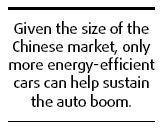Opinion
The cost of auto boom
(China Daily)
Updated: 2009-11-11 08:37
This will be a year of milestones for many carmarkers in China with both production and sales of new vehicles having exceeded 10 million units in the first 10 months for the first time.
However, while enjoying these robust figures, domestic automakers should not lose sight of the rising cost of driving in this country. If they do not do their best to bring down the environmental and economic cost of their cars as soon as possible, expectations of a sustained expansion of the auto market can prove all too premature.
On Monday, the China Association of Automobile Manufacturers announced that vehicle sales reached 10.9 million units between January and October, up 37.8 percent over the same period last year.
This news is no surprise to the carmakers. Unexpectedly strong domestic sales since the beginning of the year have already made them the envy of their foreign counterparts who have been hit hard by the sluggish performance of other major auto markets around the world.

The muscular growth of the domestic auto market so far this year is generally attributed to the government's massive stimulus package, including tax cuts and vehicle upgrade subsidies for rural residents.
Yet, as carmakers prepare to expand production for next year, they should not only worry if the government will keep the tax incentives in place. The steady rise of fuel prices will only become a bigger concern for potential car-buyers.
The government raised the prices of gasoline and diesel both by 480 yuan ($70.28) per ton from yesterday - the fifth rise this year. As a result, the retail price of gasoline climbed 0.36 yuan per liter and diesel rose by 0.41 yuan per liter.
With prices at the pump reaching record levels, carmakers should no longer take this year's pent-up demand for granted.
| ||||
The rapid increase in auto production and sales has brought about not only tremendous benefits to carmakers and car-buyers, but also huge challenges to traffic control and environmental protection. The present boom has come as a pleasant surprise to carmakers who were worrying about survival amid the worst global financial and economic crisis in many decades. But it can also end sooner than expected if domestic carmakers do not pay close enough attention to the underlying environmental and economic cost.
Given the size of the Chinese market, only more energy-efficient cars can help sustain the auto boom.













